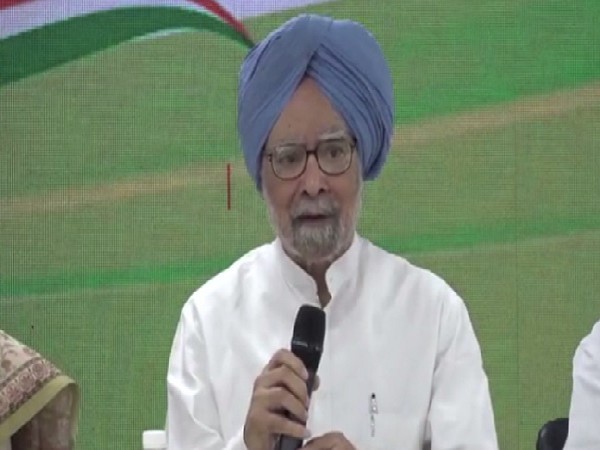'Kartarpur model' may help resolve future conflicts: Manmohan Singh

- Country:
- India
Former prime minister Manmohan Singh on Wednesday hoped the "Kartarpur model" might help in resolving future conflicts, as he and Vice President M Venkaiah Naidu addressed a special session of the Punjab Assembly to commemorate the 550th birth anniversary of Sikhism founder Guru Nanak Dev. Vice President M Venkaiah Naidu too said a new world of peace and sustainable development could be founded if teachings of the Sikh Guru were integrated into daily lives.
"Peace and harmony is the only way forward to ensure a prosperous future. The Kartarpur model may be replicated in the future too for a lasting resolution of conflicts," the former PM said. The Kartarpur corridor, scheduled to be opened on November 9, links the Gurdwara Darbar Sahib in Pakistan--the final resting place of Guru Nanak Dev--with Dera Baba Nanak in Gurdaspur of Indian Punjab.
The former PM also appealed to take forward the message of mutual love and respect propagated by the Guru to ensure an equitable society. "Guru Nanak Dev Ji's eternal message of oneness of God, religious tolerance and peace can pave the way to end sectarian violence", Singh said, adding that it was the biggest challenge faced by the world.
"Punjab is Guru Nanak Devji's karmabhoomi. How will we keep Guru Nanak Devji's legacy alive if its youth is wasted with drugs, water is becoming poisonous and women are being disrespected? It is the most crucial question on his 550th birth anniversary," Singh added. Addressing the session, the vice-president described the Sikhism founder as one of India's most democratic spiritual leaders.
Naidu said his vision "had as much relevance today as it was when it was expounded five centuries ago". Naidu, who started his address in Punjabi, said, "Guru Nanak ji belongs to the long illustrious tradition of India's visionary spiritual leaders who have illumined human existence and greatly enriched the country's cultural capital."
He said for the first Sikh Guru, differences based on caste, creed, religion, and language were irrelevant. "Our world view has been continually broadened by timeless messages of enlightened pathfinders like Guru Nanak Ji. We, as democratic political leaders, and even as common citizens, have so much to learn from the teachings of this great personality," Naidu said.
The vice president further said, "If we can internalize and integrate these messages in our daily lives, we can certainly discover a new world of peace and sustainable development." He said respect for women and gender equality was another important lesson to be learned from the Guru.
"This spirit of equality began with Guru Nanak Dev's clear recognition that there is no distinction between a Hindu and Muslim. For him, no country was foreign and no people were alien," said Naidu. He said it was worth noting that Guru Nanak initiated an inter-faith dialogue way back in the 16th century AD.
"The world needs such spiritual leaders, who can engage in a meaningful dialogue to exchange ideas in order to promote peace, stability, and cooperation," said Naidu. Naidu said Guru Nanak Dev insisted on earning one's livelihood by hard work.
"Work, worship, and share was the motto he placed before his disciples. Earn by honest labor and share the earnings with the needy," said Naidu. Underlining the message of Guru Nanak Dev, Punjab CM Amarinder Singh stressed the need to protect nature so that future generations do not suffer from environmental pollution.
Recalling the Guru's thought "pavan guru, pain pita, mata dharat mahat" (air is the guru, water the father, and earth the mother), the chief minister said this ideology needed to be preserved in letter and spirit. He appealed to make Punjab clean and green in line with the Guru's philosophy by making the optimal use of groundwater, diversifying into less water-intensive crops and stop burning paddy straw besides checking the use of chemical fertilizers.
Earlier, the session started with MLAs and MPs from Punjab and Haryana taking part in it. Haryana Chief Minister Manohar Lal Khattar, Deputy Chief Minister Dushyant Chautala, Punjab and Haryana Governors--VP Singh Badnore and Satyadev Narayan Arya--also attended the session.
It is probably for the first time after the creation of Haryana out of Punjab in 1966 that legislators of both states sat together. The Punjab assembly also adopted a resolution to carry forward the message of tolerance, compassion and environment protection.
The House dedicated itself to "Guru Nanak Dev's timeless legacy and realization of his ideals and values". The resolution read, "Transcending bonds of religion, caste, nation and race, Sri Guru Nanak Dev ji blessed the entire humanity with the boon of his unifying message of unity, equality, truth, and love."
"By calling air the guru, water the father, and earth the mother, he revealed the deep and eternal bond between nature and mankind," the resolution added. CM Amarinder Singh urged former chief minister Parkash Singh Badal to commemorate the birth anniversary of the Sikh Guru on a common platform, rising above political considerations.
Badal too lauded the state government for holding the special session and said the joint participation of legislators from Punjab and Haryana was an exemplary gesture. He urged all parties to adopt a conciliatory approach in their conduct.
Badal also called for a major re-cast of national and state government priorities to move away from the "cosmetic progress" .
(This story has not been edited by Devdiscourse staff and is auto-generated from a syndicated feed.)
ALSO READ
White House hosts muted Ramadan event as Biden's Israel policy draws anger
White House hosts muted Ramadan event as Biden's Israel policy draws anger
White House's Sullivan, recovering from cracked rib, postpones Saudi trip
White House's Sullivan, recovering from cracked rib, postpones Saudi trip
White House's Sullivan, recovering from cracked rib, postpones Saudi trip










